Clint Eastwood at 94: Few equal one of the last living legends of Hollywood
Director, actor, producer, soundtrack composer, politician... the multifaceted star has made the film set his home, a place from which he has embodied legendary characters and told stories that, like him, will be eternal
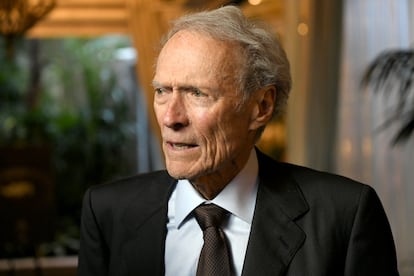
In mid-April, Clint Eastwood appeared with ethologist Jane Goodall at an event held in Carmel, the Californian town where the actor has lived most of his life and of which he served as mayor in the 1980s. The appearance of the nonagenarian actor, with a bushy white beard who was walking with some difficulty, was a topic of conversation on social networks for many users who, stupefied, realized that the timeless Man with No Name is indeed flesh and blood and that, despite having spent a lifetime in cinema, he is no young buck.
The legendary filmmaker turns 94 on May 31, but despite now making infrequent appearances at public events, he continues to work in front of and behind the camera. He has just finished shooting what is rumored to be his final movie, Juror No. 2, still without a release date. Actor, director, producer, soundtrack composer... after 70 years dedicated to the profession, with two Oscars for Best Director and more than 80 titles to his name, few can match the career of one of Hollywood’s last living legends. Revered by audiences and critics alike, he is the embodiment of a complex duality between the archetypal tough, serious and laconic character embodied in many of the films he has starred in, and his facet as a director in charge of more intimate stories, with powerful female and minority characters.
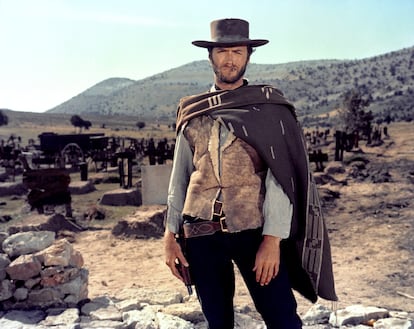
Television veteran and ‘spaghetti western’ icon
Clint Eastwood was born in another world. A place where there was no television and where becoming a movie star was not even a recurring dream because the entertainment industry had barely got off the ground. His mother, Ruth Eastwood, became pregnant during the Great Depression and on May 31, 1930, a baby weighing more than five kilos (11 pounds) was born in San Francisco, named Clint Eastwood, like his father. Four years later his only sister, Jeanne, arrived. The world was still recovering from the impact of the economic meltdown a few months earlier and during his early childhood, Eastwood spent much of his time traveling with his family, changing locations as his father found new work.
That life on the road would be reflected in many of his films. Very tall for his age, the actor has defined himself as a shy child who was fascinated when music entered his life: jazz, in particular. When interviewed on Inside the Actors Studio, he explained that he learned to play the piano “by ear,” a skill with which he was able to make a living as a teenager playing in bars in the Oakland area, where the family had settled. School never interested him much and after his high school years he decided to try his luck in Los Angeles. His 1.93 meters of height and gruff handsomeness worked as a letter of introduction. He landed his first role in 1954. However, after a stint working for Universal in bit-part roles, the studio cut him.
That could have been the end of Eastwood’s film career. Fortuitously, he received an offer for a television series at a time when middle-class American family life revolved around the device. From 1959 to 1965, he worked on the weekly TV show Rawhide. The role did not present too much of a challenge for Eastwood, but it gave him a new opportunity in the movies. Italian director Sergio Leone cast him to star in A Fistful of Dollars (1964), a spaghetti western shot in Spain, where Eastwood built his image as a thoughtful, serious and lonely man. The film was a worldwide success and Eastwood’s nameless character, clad in poncho, hat and with a cigar clenched in his teeth, returned for two more films: For a Few Dollars More (1965) and The Good, the Bad and the Ugly (1966), the second two installments of the Dollar Trilogy. An anecdote illustrates Eastwood’s position at the time: it was the actor himself who provided his costumes for the film (including the cigars). When his collaboration with Leone ended, Eastwood was one of the hottest actors on the scene, but he still needed a little more time to become a bona fide star.
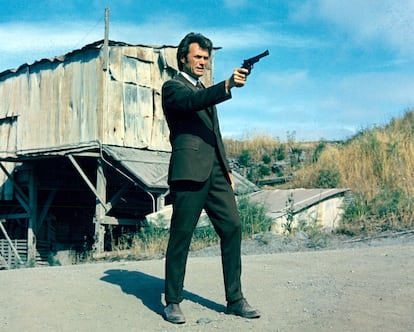
From dirty cop to celebrated director
From the outset of his career as an actor, Eastwood had been attracted to directing. On the film set, he followed the movements of the filmmakers with close attention in order to, one day, make the leap to behind the camera. The first step was to create his own production company, The Malpaso Company, with the aim of selecting the stories that, from his point of view, were worth telling. In 1971 he debuted as a director with the thriller Play Misty for Me, a work that divided the critics. Meanwhile, he continued his career as an actor, gaining popularity year after year.
At this time he worked with director Don Siegel on Dirty Harry, the first of five films starring detective Harry Callahan, a violent cop convinced that the end justifies the means. That film was released in 1971 (the last film in the saga was released in 1988) in a convulsive political context with Richard Nixon as president of a polarized country. The film was not exempt from criticism and was even labeled “fascist.” Politicized or not, from a commercial point of view it was a great success, so much so that the revolver carried by the conflictive detective, a Smith & Wesson model 29, saw sales skyrocket. The Dirty Harry series allowed him to shake off the dust of the Wild West and establish himself as the new favorite for action movies. It also linked him in the collective imagination to the image of a man who is unsentimental, a guarantor of order, and defender of authority above all else.
A proud and convinced Republican, Eastwood has never minced words and has expressed his political opinions whenever and wherever he has pleased. Even at the Oscars. At the 1973 gala, he went on stage after the Indian activist Sacheen Littlefeather had refused, on behalf of Marlon Brando, the Best Actor Oscar for The Godfather. Brando’s gesture, denouncing Hollywood’s discriminatory treatment of Native Americans, was ridiculed by Eastwood: “I don’t know if I should present this award on behalf of all the cowboys shot in all the John Ford westerns over the years,” he said in a mocking tone.
Established as one of the great directors of his time, he has never been interested in the industry beyond starring in and making movies. From the privileged position he holds, decades ago he chose to live as quiet a life as possible in Carmel, a small town in the Californian county of Monterey. A man who guards his privacy, he found in his mansion overlooking the sea, surrounded by wildlife and nature, the ideal family redoubt to live with some of his eight children (the word tumultuous is an understatement to describe the actor’s private life, fed more by rumors than confirmed facts). The idyllic village has had, and still has, great importance in the life of the actor, who was its mayor between 1986 and 1988. “I’m not a very sociable person,” he confessed to the BBC in a report years ago recorded there. “I watch the movies in a nearby cinema, I watch them with people who are not part of the industry so I can see how they react, so I understand better the reality around me,” he told the camera.
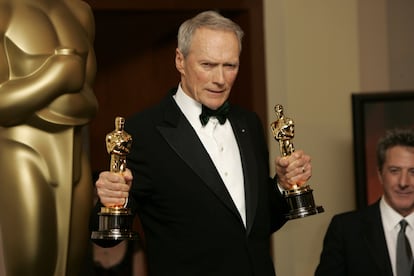
Success after 60
The definitive endorsement for Eastwood’s directing work came in the form of Oscar recognition in 1993. The film Unforgiven, a cerebral western co-starring Morgan Freeman, garnered nine nominations and won four major awards, including Best Director and Best Picture. At 63, though, some of the finest movies of his filmography were still ahead of him. He still inspired action stars like Arnold Schwarzenegger, an avowed Clint fan, with his acting, but it was his storytelling that attracted the big stars, eager to work under his direction. “He never says action and he never says cut. He’s his own person on a movie set. Wonderful,” Freeman said.
The same actor who personified police violence in Dirty Harry made even the most cynical viewer weep in The Bridges of Madison County (1995) alongside Meryl Streep. The actress recalled the making of what is one of the most iconic romantic films of all time during her appearance at this year’s Cannes Film Festival: “He made that film in five weeks. He was so quick. He was up at five in the morning to get to golf lessons in the afternoon. Basically, what you see in the film is rehearsals. That’s how he works...”
In addition to being quick and efficient in his direction, the filmmaker is accustomed to always surrounding himself with the same team, perhaps the most stable family he has ever created. In 2003, his work was recognized again with the acclaimed Mystic River, which garnered six nominations and two Oscars. When many of his peers were beginning to step back or accept low-profile but high-paying roles, he continued to string together success after success. The year after Mystic River came awards season favorite Million Dollar Baby. Eastwood produced, starred in, and directed the film, and also composed its Grammy-nominated soundtrack. The movie, nominated seven times, brought the Carmel native his second Best Director Oscar, as well as a Best Actress award for Hilary Swank and a Best Supporting Actor Oscar for Freeman.
In successive works he tackled all kinds of themes, from the Second World War in Flags of Our Fathers and Letters from Iwo Jima (2006) to the Iraq War in American Sniper (2014) and racial discrimination against minorities in Gran Torino (2008). The anti-racist discourse of that film contrasts with some public opinions expressed by Eastwood himself. In a 2106 interview with Esquire magazine, he said: “We’re really in a pussy generation. Everybody’s walking on eggshells. We see people accusing people of being racist and all kinds of stuff. When I grew up, those things weren’t called racist.” In that same interview, he spoke out about Donald Trump, downplaying the continuing racist comments the businessman had poured out during that year’s election campaign: “You know, he’s a racist now because he’s talked about this judge. And yeah, it’s a dumb thing to say. I mean, to predicate your opinion on the fact that the guy was born to Mexican parents or something. He’s said a lot of dumb things. So have all of them. Both sides. But everybody — the press and everybody’s going, “Oh, well, that’s racist,” and they’re making a big hoodoo out of it. Just fucking get over it. It’s a sad time in history.” It seems Trump’s stewardship didn’t win Eastwood over because four years later he expressed his support for Democratic candidate Michael Bloomberg.
More than 70 years after entering the world of cinema, the Eastwood machine is still in full swing. In his latest work, the thriller Juror No. 2, he cast Nicholas Hoult and Toni Collette in the lead roles in a story set during a murder trial, the shooting of which was completed last April. What seems unlikely is that the filmmaker will be seen in public to promote it. His appearances in recent years have been almost nonexistent, but the truth is that he has never been willing to walk the red carpet any more than necessary. His place is on the film set, his habitat, the place where he has embodied characters capable of transcending the passage of time and where he has directed films that, like Eastwood himself, will be eternal.
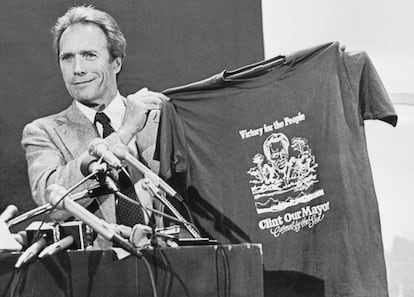
Sign up for our weekly newsletter to get more English-language news coverage from EL PAÍS USA Edition
Tu suscripción se está usando en otro dispositivo
¿Quieres añadir otro usuario a tu suscripción?
Si continúas leyendo en este dispositivo, no se podrá leer en el otro.
FlechaTu suscripción se está usando en otro dispositivo y solo puedes acceder a EL PAÍS desde un dispositivo a la vez.
Si quieres compartir tu cuenta, cambia tu suscripción a la modalidad Premium, así podrás añadir otro usuario. Cada uno accederá con su propia cuenta de email, lo que os permitirá personalizar vuestra experiencia en EL PAÍS.
¿Tienes una suscripción de empresa? Accede aquí para contratar más cuentas.
En el caso de no saber quién está usando tu cuenta, te recomendamos cambiar tu contraseña aquí.
Si decides continuar compartiendo tu cuenta, este mensaje se mostrará en tu dispositivo y en el de la otra persona que está usando tu cuenta de forma indefinida, afectando a tu experiencia de lectura. Puedes consultar aquí los términos y condiciones de la suscripción digital.









































